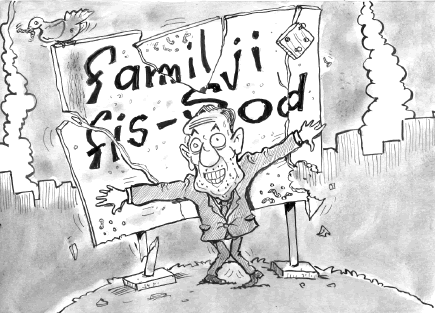
| OPINION | Sunday, 18 May 2008 A wake-up call Statistics issued by the National Statistics Office this week make riveting reading, and should serve as a wake-up call for all persons interested in the state of the family and related matters in Malta.
The statistics speak for themselves: 2,309 Maltese persons with recognized foreign divorces in Malta; 11,045 separated persons; one in four births registered outside marriage; 3,605 single parent households… taken together, these figures present an image of the state of the family today. A far cry from the belief of many, though not of all, that the family in Malta is still a very tightly knit unit: which in a sense it still is, although cracks in the edifice are becoming daily more pronounced. These figures should trigger a discussion in the country on the issue of divorce, co-habitation rights and the singles culture. For far too long the political class, including politicians of all the traditional parties, have not only ignored this reality, but in patronizing tones have simply urged couples to prepare themselves better for a marital commitment. When marriages fail, however, our politicians simply advise patience, understanding and forbearance… without any commitment to offer these persons any possibility of a second chance and opportunity to start a new life. Hopefully these statistics, and the pain certain persons are going through, will wake up our political class and incite them to change the law before inevitable cases before the European court recognize the status of a common law in Malta, too. The crux of the matter lies not in what can better be done to keep a relationship going, but whether the state should be totally absent and allow family matters to be dictated exclusively by the teachings of our Christian faith and church. On assuming his pastoral duties, the newly chosen Archbishop, much to his credit, immediately delineated a line between matters of state and church. While the church, quite rightly, remains attached to its teachings which prohibit divorce and disencourage cohabitation, the civil authorities should be free to enact laws which regulate family matters independently of the church’s opinion. This separation between the church and the state, the Archbishop affirmed, is fully respected by the church while feeling free to make known to all and sundry its disagreement with certain laws. This bold affirmation, absent from the words of all previous Archbishops, should serve as a guideline to all discussions, regulations and laws which could eventually be introduced in the country, allowing for an open debate characterised by mutual respect and acceptance, thus putting behind us the nasty tensions that existed between state and church in the 1960s, and the ugly scars these left in their wake. The introduction of civil marriage and the recognition of foreign marriages in 1975 were positive developments, as was the right of married women in the eighties to receive maintenance without the need to institute legal proceedings. Yet in the present climate, in which half as many separations as weddings taking place annually in Malta, we feel that the 1995 church state agreement regulating ecclesiastical and civil tribunals, and giving preference to the ecclesiastical ones, was a step in the wrong direction which needs to be revisited. The way forward for a discussion on both divorce and cohabitation rights has to be placed on the political agenda, with discussion encouraged within the political parties and via the media in the country as a whole. This should be followed by either a referendum on the matter – a route we do not favour, since in matters of civil rights, majority approval need not be the deciding factor – or a private member’s bill placing the matter up for discussion, with a free vote granted to all members of parliament. We sincerely hope that these published statistics will not simply fly over the heads of the political class, fearful of touching such sensitive issues either for loss of votes, or worse still because of reluctance to offend the church. Now that the Archbishop himself has accepted the principle of church-state separation, there is no more reason to delay the discussion further. Any comments? |
Copyright © MediaToday Co. Ltd, Vjal ir-Rihan, San Gwann SGN 9016, Malta, Europe
Managing editor Saviour Balzan | Tel. ++356 21382741 | Fax: ++356 21385075 | Email
Managing editor Saviour Balzan | Tel. ++356 21382741 | Fax: ++356 21385075 | Email
